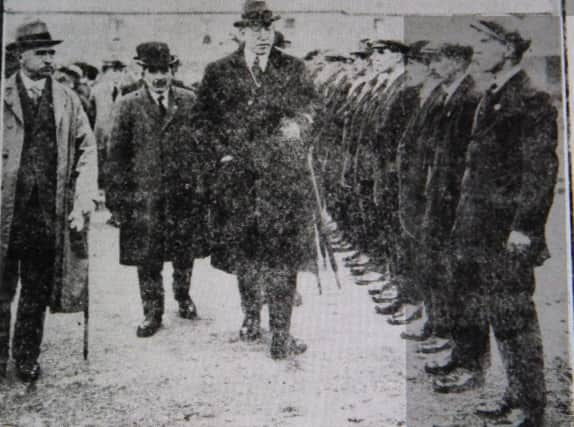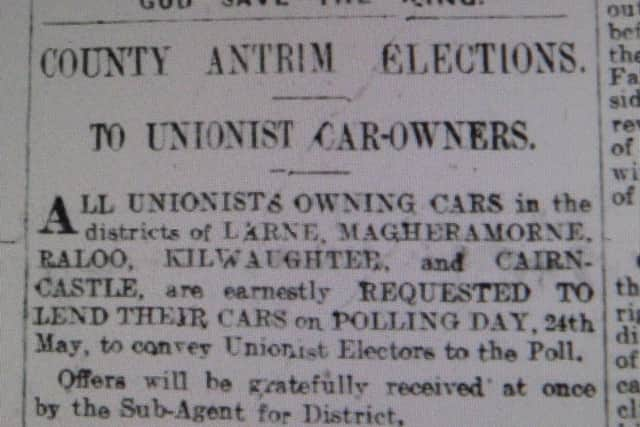NI Centenary: Election focus in east Antrim as NI was about to come into being


The Larne Times reported on a number of election meetings, including several for Unionist election workers at locations such as Cairncastle, Raloo and elsewhere. Speakers had included William Chaine and the editor of the newspaper T.L. Price.
There had also been public meetings when candidates such as the Labour Unionist John F. Gordon spoke, including a major event in Larne preceded by local bands parading the town.
Advertisement
Hide AdAdvertisement
Hide AdGordon told the rally that “They were facing the dawn, the dawn of Ulster’s prosperity” and pledged to do all he could for the unemployed.


Several other unionist candidates for the seven seats in Co Antrim also spoke.
When the election ballots were counted for the first parliament, meanwhile, all six unionist candidates were elected, along with nationalist leader Joseph Devlin, who was elected in West Belfast as well but did not take either seat as nationalists boycotted the parliament.
The overall result of the election saw 40 unionist MPs, 6 nationalist, 6 Sinn Fein, 4 Belfast Labour and one independent elected.
Advertisement
Hide AdAdvertisement
Hide AdThe election campaign was conducted amidst ongoing violence in the south of Ireland and attacks also nearer home.
One heading in the paper was ‘Weekend Bath of Blood’, which gives a flavour of what was going on.
At Belfast docks a young harbour policeman, Alfred Craig (24) was shot dead after an attack involving several men, while in Inishowen in County Donegal two off-duty constables were shot dead and their bodies thrown into the sea.
The body of Constable Clarke was later found washed up but that of recently married Constable Murdock, a native of Liverpool, remained lost, the paper reported on May 21, 1921.
Advertisement
Hide AdAdvertisement
Hide AdThere were numerous other attacks, including the murder of Head Constable Storey in Co Kerry on his way from church and an attack on a party of RIC men cycling to attend Mass in Carlingford, during which one was injured.
The tensions had over spilled also in Glasgow, when republicans tried to free an IRA prisoner being transported to prison, a police inspector being shot dead and another officer wounded.
The gunmen had fled without achieving their aim.
Ten men had appeared at Dumbarton Sheriff Court charged with drilling on Carmen Moor after police swooped on a party of up to 60 “Sinn Feiners” who had been watched from a distance through “powerful glasses”. They were remanded in custody.
Meanwhile, the Belfast to Dublin goods train had been halted in the early hours of the morning outside Bessbrook by armed men and items removed and burnt.
Advertisement
Hide AdAdvertisement
Hide AdIt was reported that messages were posted on the train which read “No admittance to Irish Ireland. We’ll give you partition.”
The attack came amidst a boycott of Northern Ireland goods in the south.
In the midst of this the Unionist leader Sir James Craig had a meeting with Eamonn De Valeria, the republican leader, in Dublin, later telling unionists that both he and Sir Edward Carson believed that better understanding was important between both parts of Ireland.
Craig was applauded at a unionist meeting in Holywood when he referred to the meeting and he was quoted as saying at nearby Strandtown “We are not a mean community. It does not say we are going to close ourselves in and turn our backs on the others. We here are going to work the Act for the benefit of the people…we are going to be tolerant and we are going to be fair.”
Advertisement
Hide AdAdvertisement
Hide AdHowever a warning from the Chief Secretary of Ireland, Hamar Greenwood MP, would have sent alarm bells ringing for many.
He told the House of Commons that documents captured from Sinn Fein showed that an offensive by the IRA was to be opened in Ulster to disrupt the elections for the new Belfast parliament, and that possible action against the Belfast water supply and other acts of sabotage were contemplated.
The state of affairs in the South must have seemed close to anarchy for readers of the Larne Times.
Each week they were reading of attacks on the police and of military attacks on republican raiders, and one report of how two Protestant families had been burnt out of their homes near Bandon in Cork appeared in the same edition as reports on the shooting of James Moloney, the son of the South Tipperary MP being shot dead by the military at Limerick Junction and a captured RIC District Inspector named Gilbert Norman Potter being tried by a republican court and executed, a letter then being sent to inform his wife.
Advertisement
Hide AdAdvertisement
Hide AdIn Larne no such terrible drama touched directly, but it no doubt led to increased anxiety about the political future.
The local branch of the Ulster Unionist Labour Association pledged to give preference to Northern Ireland goods over those from the south of Ireland in response to a boycott of Ulster goods there.
The Sun Laundry meanwhile had been affected by issues across the channel, after the Stranraer steamer was taken off due to a coal strike brought about by miners protesting about the return of the mines to private companies and a reduction in wages.
At that time up to 25 per cent of the business at the Larne laundry had been with the south of Scotland and it looked that many female employees would be made redundant.
Advertisement
Hide AdAdvertisement
Hide AdBut James Houston of Larne Harbour had stepped in by commissioning a special boat to go across to Stranraer for goods.
The Forget-Me- Not had, it was reported, saved jobs in Larne.
Also at the Harbour, stationmaster and steamer agent Henderson Davison had retired after 45 years’ service with the company.
Another retiree was William Brown, manager of the Northern Bank, who had been with the company for 43 years in total and had purchased Crampton Lodge at Larne Harbour to retire to. He was replaced by R. J. Douglas, who came from the Keady branch.
Advertisement
Hide AdAdvertisement
Hide AdLarne Golf Club at Islandmagee had opened a newly extended course and a large number of golfers watched club captain James Macartney OBE formally open it by driving off the first tee.
Larne Grammar School had good news in that a bequest from the late Thomas Carson of the Knowe would establish two scholarships in the names of his sons.
Both Lt. Colonel Hebert William Carson and Captain James Arthur Balfour Carson had been killed in the First World War.